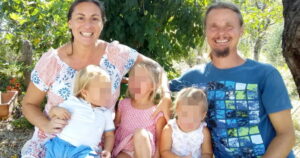
A new diphtheria epidemic in northern Algeria has brought public health specialist Amira Mansouri and a team of volunteers and officials from the Ministry of Health to the mountainous area of Ben Azzouz in Skikda province. There, they went door-to-door in homes to reassure mothers and explain to them the importance of vaccinating their children against this disease that had been eradicated from Algeria in the 1990s, but which has recovered since 2022. This time, it is the result of the death of a 12-year-old girl and a 25-year-old migrant boy, who died in Skikda in October due to this disease. No one has been vaccinated against this bacterial infection.
The resurgence of diphtheria in Algeria has reached record numbers. According to data from the yearbook of the National Institute of Health of Algeria, 1,124 cases occurred in 2024. Of these, 163 were confirmed by the reference laboratory of the Pasteur Institute of Algeria. The same laboratory has confirmed 86 cases so far in 2025. Since October, with the two deaths and five additional cases of Skikda, the authorities have activated a mass vaccination campaign. In the first two days they served more than 500 people. Medical teams spread across mountain villages and neighborhoods, going door to door to make sure everyone got their dose.
“There is no shortage of vaccines, but rather people are aware of the need to respect the programs,” clarifies Mansouri. “Some families, especially in cities, postpone vaccination for very simple reasons: distance, parents’ work or even fear of side effects,” he explains. Others, he adds, don’t go to health centers because they don’t know that the vaccine is free. “It’s shocking that a lack of data like this could open the door to a deadly disease,” he laments.
Diphtheria, which is transmitted through droplets expelled when you cough or sneeze, primarily affects the throat and respiratory system. In severe cases, the potent toxin produced by the bacteria can spread into the bloodstream, damaging vital organs, particularly the heart and nerves, and leading to complications such as inflammation of the heart muscle and paralysis of the nervous system. The disease is fatal in 5% to 10% of cases. But it is also preventable thanks to the DTP vaccine, which also protects against tetanus and whooping cough, in the doses that are administered to children at two, four and six months, with subsequent boosters.
In Algeria, vaccination coverage has been above 90% for children under one year of age since the 1990s, making it one of the countries with the best immunization records in all of North Africa. However, recent reports indicate that there are monitoring failures in mountain and desert villages, where it is difficult to reach a health center or where vaccinations are postponed due to little awareness of their importance.
Mustapha Khiati, president of the National Foundation for Health Promotion and Research Development, warns that overconfidence poses the greatest risk. “This is a serious disease, not a thing of the past as some people think. As long as there is only one unvaccinated child, there is a possibility that it will reappear,” says the expert.
It is a serious disease, not something of the past as some think. As long as there is even one unvaccinated child, there is a possibility that it will reappear
Mustapha Khiati, President of the National Foundation for Health Promotion and Research Development
According to Mansouri, the rapid reaction exposed deeper problems. Staff shortages in more remote areas have created gaps in immunization campaigns and some families are less aware of health issues, so they may think that vaccination is optional and not essential.
Some families, especially in cities, postpone vaccination for very simple reasons: distance, parents’ work or even fear of side effects.
Amira Mansouri, public health specialist
Khiati, for his part, adds that parents of this generation, who have not experienced epidemic diseases, may downplay the importance of vaccination. For the expert, it is essential not only to guarantee the availability of vaccines, but also to regain people’s trust in the healthcare system.
Islam Khalfaoui, an epidemiologist and virologist at the city’s public hospital, says the current situation does not amount to an epidemic. He stresses that the number of cases remains limited, but remembers that vaccination failures can cause the re-emergence of already controlled diseases.
“Since 2022, we have observed a decrease in vaccinations due to the Covid 19 pandemic around the world, especially in developing countries. Some programs were interrupted or postponed and, therefore, it was foreseeable that cases of this type could appear at any moment. The important thing is to react quickly, as was done here, in Skikda,” he says.
Although Skikda has received most of the public attention, health authorities note that some southern and border regions, particularly Guezzam and the Bordj Badji Mokhtar area, continue to record high numbers of suspected diphtheria cases. Experts estimate there have been between 50 and 100 suspected cases in these sparsely populated areas, where population mobility and migration flows from the Sahel complicate surveillance and monitoring.
Already a year ago the International Federation of Red Cross and Red Crescent Societies had warned of the critical situation in southern Algeria. According to a report published by the organization, in July 2024, nearly 6,000 people crossed the border from Mali to Algeria fleeing clashes between the army and rebel groups. “As a result of massive population displacement, Algeria’s southern wilayas have been overwhelmed and the public health crisis in these areas has rapidly worsened. By the end of September, 115 cases of diphtheria and 28 deaths had been recorded,” the document reads. The biggest challenge was “insufficient vaccination coverage” of displaced populations.
Skikda protects itself
On the streets of Skikda there are few signs of crisis. The seafront is full of people, street vendors displaying autumn dates and students heading to university. Now, inside the small clinics, exhausted doctors and worried mothers have another perspective.
At a vaccination room in the municipality of Ain Cherchar, Lamia, 30, holds her young son in her arms as she waits with 10 other women with their children. “A nurse came to the house to vaccinate my son. I was very happy, we had been waiting for months,” he explains to EL PAÍS. “We don’t want to hear any more about a disease from the past. When I heard that there had been two deaths I was very scared, but now I feel safe. The important thing is that they haven’t forgotten us.”
At the provincial health directorate, the deputy director, who asks to remain anonymous because he is not authorized to speak to the press, points to a wall map full of red circles indicating the disease surveillance points.
“The situation is completely under control. We have contained all cases and know their origin. Vaccines are available in all centers and campaigns continue regularly,” he says, adding that officials monitor all suspected cases in the field on a daily basis and that there is constant communication with the Ministry of Health. “We prefer to be cautious rather than surprised.”





